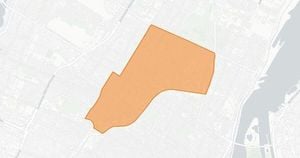The Ministry of Home Affairs in Vietnam is preparing to adjust the regional minimum wage starting in March 2025, which comes amid a growing discussion on how such changes will impact laborers across the country.
According to officials, the adjustments will consider the division of wage regions, which aligns with the rearrangement of administrative units and the merger of provinces and cities. Countrywide, workers are hopeful for a wage increase that will help combat the rising costs of daily living.
"I hope for a salary increase soon so that bonuses and allowances will also increase, and I also hope that the state will find a way to keep the prices of food, drinks, electricity, and water from increasing," expressed Ms. Hang Thi Say, a worker from Xin Man in Ha Giang. Having previously struggled with seasonal work at an electronics company in Bac Giang, she eventually transitioned into a more stable contract role. With her experience, she notes that after each Lunar New Year, work opportunities increase, which allows her to send home 1-2 million VND to support her children.
Despite her positive outlook, Ms. Say finds herself grappling with various financial pressures. "Even when my earnings are better, my husband and I still juggle the costs of rent, transportation, food, and savings for emergencies," she shared.
Insights from Mr. Le Dinh Quang, deputy head of the Policy and Law and Labor Relations Department of the Vietnam General Confederation of Labor, shed light on the broader narrative of wage adjustments. Mr. Quang asserted, "The minimum wage is the simplest payment for employees in normal conditions to ensure their minimum living needs and that of their families." He explained that this minimum is essential for sustaining basic life requirements, essentially acting as the baseline for negotiations.
Mr. Quang indicated that the upcoming proposals for salary adjustments will factor in several variables. These include labor supply and demand, the consumer price index (CPI), economic growth rates, labor productivity, and business affordability. The proposals will then be taken to the National Wage Council, which is tasked with agreeing on wage plans and advising the government on necessary changes.
In Mr. Quang’s view, a wage increase does not simply benefit the workers but is also a stimulus for economic productivity at large. He remarked, "Increasing the minimum wage will stimulate employees to work enthusiastically and increase labor productivity. Time and again, we have seen that despite wage hikes, many employees still find it hard to make ends meet, and the demand for raise adjustments is clear from their voices for 2025."
As discussions continue among stakeholders, the implications of these potential wage adjustments resonate deeply within Vietnam’s labor landscape. Workers like Ms. Say voice a universal sentiment shared among many: the urgent need for income increases that correspond with the escalating costs of living.
In light of the developing situation, employees and employers alike await the National Wage Council’s recommendations and the subsequent decisions that will influence not only the economic wellbeing of the labor force but the overall health of the Vietnamese economy.




